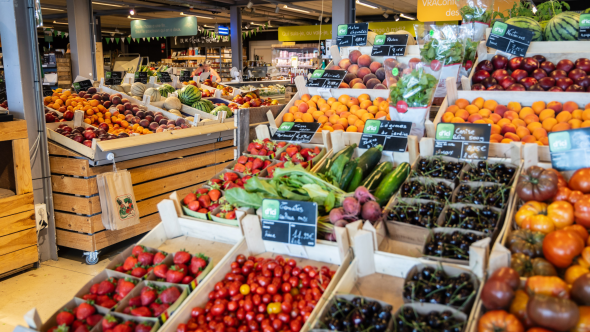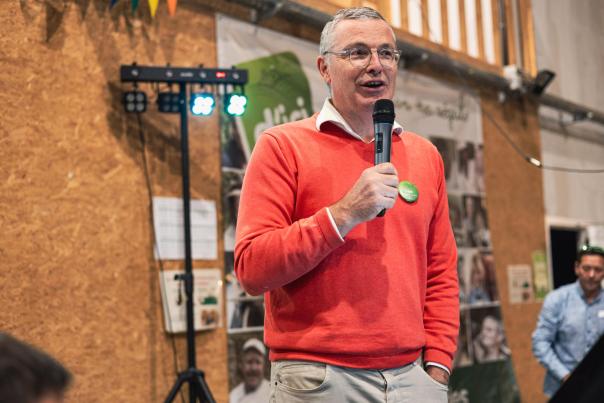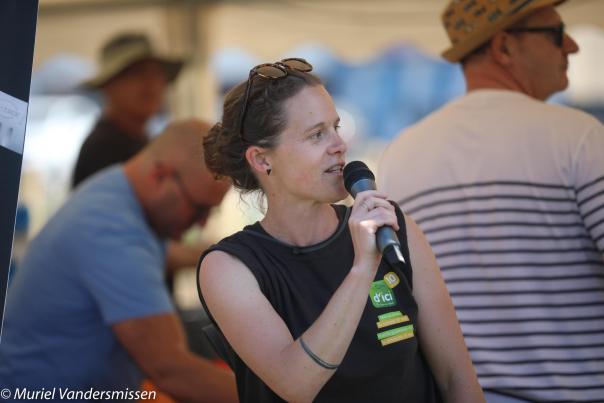Magasins D'ici: a local offering created by UNamur alumni
A tasty, local and sustainable food offer: that's the challenge facing D'ici stores, based in the Namur region. At the head of this initiative are three UNamur alumni in search of proximity.

A tasty, local and sustainable food offer: that's the challenge facing D'ici stores, based in the Namur region. At the head of this initiative are three UNamur alumni in search of proximity.

This article is taken from the "Alumni" section of the September 2024 issue of Omalius magazine.
As a child, warehouses and department store aisles were a favorite playground for former UNamur student Frank Mestdagh. Now part of the Intermarché Group, SA Mestdagh has been a key player in the Walloon and Brussels retail sectors for over a century. After completing his studies in economics and social sciences, Frank Mestdagh worked in a variety of fields, but eventually returned to the family DNA. "I took over a company that cut charcuterie for the mass retail sector, gradually realizing that the model didn't suit me", he recounts. It was at this point that he discovered Ferme du Sart (now Otera du Sart), a French chain specializing in local produce. "I thought it was really smart: you could feel the closeness to the producers, there were fewer denatured, over-marketed products. France was and remains very much ahead of the game when it comes to this type of trade, probably because of a sense of regional belonging, but also because there's a much larger fabric of producers and artisans." Frank Mestdagh then began to develop the D'ici stores project and opened his first store in Naninne in May 2013. Three years later, another store - now closed - saw the light of day in Hannut. "In retrospect, it was a mistake." In 2021, it's Wépion that finally welcomes a second successful outlet. 2025 will see the opening of a third store in Champion, still in the Namur region.
For Élisabeth Bois d'Enghien, entrepreneurship is also a family affair. "I have a father who is a company director and who was a bit of an example for me in terms of vision and management. I think I had something to prove to him by choosing this direction. " The woman who considers herself above all a generalist - "during a skills assessment, I was told that I could do just about anything, but that I'd never be an expert"will pursue a bachelor's degree in social sciences and management from UNamur, with a particular interest in courses in philo, socio, social sciences and history. "I wish I'd had today's maturity to grasp the interest of the subject," she analyzes. Whatever the case, Élisabeth Bois d'Enghien is convinced that it's less the diploma that makes the difference than "what you've got in your belly." In 2021, after a career start in telecommunications and a period of"bumbling around the world", she joins the D'ici store adventure. "What attracted me was the whole story Frank was telling, everything that goes beyond food, what it generates in terms of bonds between people."
For his part, Jérôme Bette, a graduate in management engineering from UNamur, worked for a long time in marketing for a clothing chain. "With all the problems of fast fashion that we know", comments the man who was looking for more meaning in his work. In 2022, he in turn joined D'ici stores. "I've found that the great strength of the project is that we're not extremist in our positioning. This allows us, little by little, to bring a less informed public towards something that makes sense," he comments. "Where, when the identity is very strong, it can be a hindrance." The brand has thus chosen local over organic. "I'd say that in terms of prices, we're around 10-15% more expensive than mass retailers, while remaining 10-15% cheaper than an organic chain," estimates Frank Mestdagh. For Jérôme Bette, the important thing is to work above all on quality and proximity. "It's not realistic to fight on price," he sums up. "Our wish is for the customer to understand that he's paying the right price and that it's the price he's paying elsewhere that isn't fair. When chicken is 3 euros a kilo, that's where the problem lies...". "The gamble will be won when everyone knows that we're doing local and not organic," adds Élisabeth Bois d'Enghien. "Because local means geographical proximity - with 50% of products coming from less than 50 km around - but also relational proximity. The producers, even if they come from further afield, we know their first names..." Even more than yesterday, Frank Mestdagh believes in the relevance of a very local anchoring in the Namur region. "Today, we have customers who are very attached to the concept, which gives us - as well as the producers - a great deal of trust capital," the founder enthuses.
1986-1991: bachelor's and master's degrees in economics and social sciences at UNamur
2012 : creation of D'ici
An anecdote: "I remember stumbling into the elevator with the late Professor Charles Jaumotte, just after he'd delivered his terrific introductory economics course. He was out of breath, exhausted from having 'given everything' to the students."

2004-2006: bachelor's degree in social and management sciences at UNamur, then master's degree at UCLouvain.
2021 : start at D'ici stores
A piece of advice:"One piece of advice I received during my studies and have followed: be curious, and open yourself up to the unknown, feeding your curiosity through all types of sectors and experiences."

2002-2006: bachelor's degree in management engineering at UNamur
2022 : debut at D'ici stores
A piece of advice:"After two painfully successful first years, everything became easier when I applied two simple principles: diligence and organization. These studies have given me the curiosity and critical thinking skills I need to decode the issues that concern me and be able to respond to them in the best possible way."

This article is taken from the "Alumni" section of Omalius magazine #34 (September 2024).
